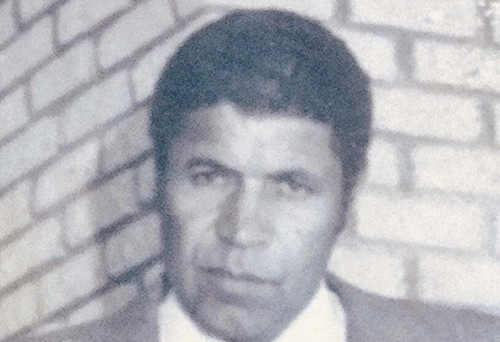The name Herbert Conradie is synonymous with Namibian football. After all, he was the man who transformed the face of domestic football in many ways.
The towering administrator was way ahead of his peers when it came to proper planning on how football clubs should be administered.
He had a special knack for talent, and it was during his tenure at the helm of exciting Nomtsoub outfit Etosha Lions that he undertook a historic rail tour for a series of high-profile exhibition matches in neighbouring South Africa in the early 60s.
The Lions of the North, led by incumbent Namibian head of state Dr Hage ‘Danger Point’ Geingob, returned home a much changed and wiser team from their eye-opening South African safari.
The team was the envy of every neutral fan, displaying their newly acquired style of play and different approach to the game. In 1969, Conradie and his wide-awake management team organised a tour to neighbouring Angola for a series of exhibition matches in that neck of the woods.
In an effort to make the already star-studded team more competitive, Conradie solicited the services of South African ball juggler one Percy ‘Chippa’ Moloi to take the boys through their paces.
Sadly, the envisaged tour across the Kavango River never materialised as chief financial backer TCL reneged on their early undertaking to fund the Angolan tour.
This created disgruntlement among the team’s playing personnel, who felt emotionally attached to their newly found idol. The team was obligated to organise exhibition matches in Tsumeb and Windhoek, respectively, to raise funds for Moloi’s services. However, the sweet harmony between Moloi and team management hit a snag when the team failed to honour its financial obligation towards the South African import upon completion of their final exhibition matches at the old Katutura stadium in Windhoek.
By now, resolutely backed by the majority of the playing personnel, the fed-up Moloi resolved to dissolve the team to form a new one that, succeeded the Etosha Lions. This led to the birth of Chief Santos. Although historically known as a Tsumeb entity, in reality, Santos was indeed birthed in the city of bright lights Windhoek. The name Chief Santos was proposed by Moloi.
Conradie did not rest on his laurels and immediately relocated to Windhoek soon afterwards, only to team up with the pair of enthusiastic football administrators, homeboy Henry Kandundu-Schultz and Ben Gariseb, to establish Poison Cobras Football Club.
The new kid on the block attracted the crème de la crème of domestic football that included former Lions stars Eliphas Sabatha, Ectos Kandundu, Doc Hardley, Kapapi Ochurub, and young Steps Nickel, barely out of his pair of shorts.
Other prominent players in the fold were Sigab ‘Okambua Kombandi’ Williams, Safe Kuruseb, and Gerson van der Byl, among a galaxy of super stars.
The team quickly knuckled down to some serious business and undertook a tour down south for a few exhibition matches against local teams in Kimberly. Burly defender Sabatha was later signed by leading local outfit Dalton Brothers to play professional football in South Africa following his near faultless display.
Conradie also single-handedly masterminded South West Africa’s (SWA) Blacks Invitational Eleven’s historic triumph in the now defunct biannual South African Provincial Impala Cup in Johannesburg in 1974. Poison Cobras had a strong representation spearheaded by the quintet of Sabatha, Hardley, Kuruseb, and Kandundu — certainly no mean feat.
A man of few words and uncle to prominent local lawyer Dirk Conradie, the towering football administrator played a vital role in organising August friendlies against visiting top teams from South Africa that included the historic visit of Kaizer Eleven in 1969, which paved the way for Pele Blaschke and Lemmy Narib, to sign professional contracts with the visiting Soweto giants following their impressive jaw-dropping displays in the three-legged friendlies.
Apart from football, the streetwise Conradie was a man of remarkable pedigree, politician, and community leader who never hesitated to help the needy. He was a schoolteacher, township superintendent, businessman, and to put the cherry on top of the cake, he was the first black traffic officer in the copper town (Tsumeb).
Regrettably, Conradie transitioned to eternity way before he could properly reap the fruits of his sweat and hard work when Namibia finally attained her long-awaited independence in 1990.
In a touchy commendable gesture, the courageous inhabitants of Khorixas gathered some commendable wisdom, usually unheard of in other corners of our beloved Land of the Brave, to honour Conradie in the most dignified fashion, and rightfully so, by naming their most treasured asset (the football stadium) after this great son of the soil.
He was also bestowed with the distinct honour of having a street named after him in the heart of the Damara section of Katutura, near the vicinity of the Oputuwanga Beer Hall for natives.
Namibians have developed this nauseating habit of undermining sporting integrity by worshipping politicians at every turn at the expense of more deserving athletes. Sports stadia should not be named after elected politicians, period…! Such practice is an insult to our sporting icons and a grave error of injustice, which could come back to haunt us harshly in the long run.
May the gentle soul of Herbert Albert Conradie continue to rest in power. Namibia is indeed blessed to have you in our midst; you have certainly run the race and accomplished your mission.


